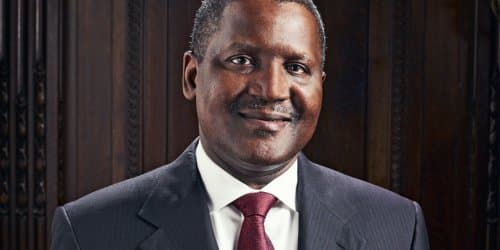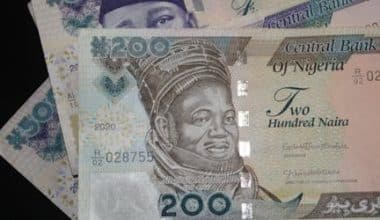You might be wondering how the famous, Aliko Dangote became so rich and also known as the richest in the country. Well, one thing that is for sure is that it wasn’t all roses.
He had to overcome numerous obstacles, including a lack of education and finances. Despite these obstacles, Dangote persisted and began to grow his fortune through commodities, cement, and petroleum companies. He began to reinvest his gains and diversify his interests as he got more wealthy. Let’s dive into some more details about him.
Biography Of Dangote
Dangote was born in 1957 into an affluent family in Kano, Nigeria. He began his career working for his uncle’s business after receiving a degree in business studies. He founded his own trading company in 1977, and by the 1980s, he had established himself as a prominent participant in the commodities market.
He started Dangote Group in 1990, which expanded to become one of Africa’s greatest businesses. Since then, Dangote has expanded into a range of businesses, including cement, flour, and sugar.
A variety of things have contributed to Dangote’s success. His ability to spot possibilities and take controlled risks is a critical aspect. Another factor is his excellent work ethic and capacity to persevere in challenging situations.
Dangote is also well-known for his charitable contributions, having given millions of dollars to organizations in education, health care, and disaster assistance. He has been named one of Africa’s most prominent persons, and he remains a tremendous figure in business and philanthropy.
Read Also: How to Become a Billionaire in Nigeria (Updated)
Dangote’s career took a crucial turn in 2000 when he obtained a large deal with the Nigerian government to import cement. This transaction provided him with access to a wide market and enabled him to grow his cement business into one of the largest in Africa.
Dangote, in addition to cement, has grown into other industries such as sugar and flour. Dangote Group, his company, is currently worth billions of dollars and employs tens of thousands of people.
Dangote’s achievements have not been without scepticism. He has been charged with corruption and exploiting his influence to secure government contracts. Dangote, on the other hand, has refuted the charges and stated that he is devoted to ethical business practices.
Despite the issues, Dangote’s commercial empire continues to expand, and he remains one of Africa’s most powerful figures. Dangote’s success has earned him not only cash but also fame and power. In Nigeria, he has become a famous figure, and he has been highlighted in foreign magazines such as Forbes and Bloomberg.
Dangote has also become a role model for many young Africans, who regard him as proof that success is attainable despite the problems of poverty and lack of opportunity.
According to Bloomberg, the Dangote Group founder is Africa’s richest man, with a net worth of $12 billion. According to Forbes, he is also the world’s richest black person. The majority of the entrepreneur’s fortune stems from his 85.2% investment in Dangote Cement, the largest cement producer in Sub-Saharan Africa.
How Nigeria’s Billionaire, Aliko Dangote, Became Rich
Aliko Dangote is largely regarded as one of Africa’s most successful and richest businessmen. He is the founder and CEO of the Dangote Group, a multi-billion-dollar conglomerate with holdings in cement, sugar, oil and gas.
Dangote’s success can be attributed to a variety of factors, including his ability to recognize possibilities, his leadership style, and his ability to negotiate favourable deals. Let’s take a closer look at his background and how he created his businesses.
His First Debut into Business
Dangote’s business career began in the 1970s, when he began trading commodities such as sugar, rice, and wheat. He was able to capitalize on Nigeria’s rapidly expanding economy, which gave him numerous opportunities to profit.
This early success provided him with the funds he needed to invest in other enterprises and grow his activities. Dangote’s early companies were mostly focused on commodity trade. He would buy items from local farmers and then sell them to traders in Nigeria’s cities and towns.
He was able to profit by purchasing commodities at low costs and selling them at higher prices, taking advantage of the country’s expanding need for goods. He was also able to obtain favorable deals with local farmers, providing him with a competitive advantage.
The Expansion Process of His Business
Dangote realized that there was a growing demand for cement in Nigeria, but there were very few indigenous cement makers. He opted to invest in a cement plant in Obajana, Kogi State, in the early 1990s.
This was a high-risk approach that paid off handsomely. The plant swiftly became Africa’s largest cement plant, and Dangote was able to capitalize on the country’s expanding cement demand.
Dangote’s entry into the cement sector began with the construction of this cement factory. In the years thereafter, he has developed more cement facilities in Nigeria and across Africa.
This enabled him to enhance his market share and cement his position as Africa’s biggest cement maker. Dangote was also able to invest in other infrastructure projects, like as power plants and ports, to help his cement company thrive. It was a well-thought-out strategy that paid off handsomely.
Beginnings in the Manufacturing Industry
Dangote’s cement business was only the beginning of his foray into the industrial industry. He began investing in additional manufacturing enterprises, such as flour milling, sugar refining, and pasta making, in the early 2000s.
This enabled him to diversify his firm even further and lessen his reliance on a single industry. This was a critical component of his plan to play a significant role in the African economy.
Flour milling is one of Dangote’s most important manufacturing companies. In the early 2000s, Dangote began investing in flour milling, beginning with the construction of a big mill in Lagos. Following it, more mills were built in various parts of Nigeria and Africa.
Dangote also began investing in wheat farms in order to ensure a consistent supply of raw materials for his mills. These investments enabled him to increase his market share in the flour milling industry while also creating synergies across his different enterprises. Do you want to learn more? Let’s look at some more fascinating facts.
Debt repayment and controversies
Dangote’s enterprises flourished, and he found himself in a lot of debt. He did, however, have a strategy to pay it off. He was able to obtain funding from international banks and investors, allowing him to refinance his debt and reduce his interest payments. This freed up additional funds for reinvestment in his businesses, allowing him to expand further.
It’s also worth mentioning that Dangote has used tax cuts and incentives quite wisely. He has worked with the Nigerian government to gain tax exemptions and incentives for his firms, allowing him to reduce costs while increasing earnings. This has also enabled him to pour more money into his enterprises and grow them even further.
The Nigerian government established the Export Expansion Grant (EEG) initiative in the early 2000s to provide incentives to exporters. Dangote took advantage of this strategy by exporting cement and other items to foreign countries, earning him substantial tax advantages. This enabled him to reduce his costs even further and boost his profitability.
Making his own electricity
His requirement for electricity increased as his company expanded. But because Nigeria’s electrical supply was unstable and expensive, he decided to take matters into his own hands. He constructed a power plant to deliver electricity to his enterprises and plans to sell power to the national grid.
This was a large investment, but it has paid off in lower costs and increased reliability. One of the most intriguing aspects of Dangote’s power plant is that it is powered by natural gas produced as a byproduct of his cement manufacturing.
This is an example of Dangote’s creative problem-solving and efficiency-creation methodology. He is not only saving money by employing this byproduct, but he is also lowering his environmental impact.
Access to Capital
This is yet another important component of his success. Dangote has raised funds from a number of sources, including foreign banks, private equity firms, and his own personal wealth.
This has enabled him to fund his growth and take on new ventures. He has also been able to leverage his capital access to negotiate better terms with his suppliers and customers.
In the case of his cement company, he was able to secure a long-term supply agreement with a major coal supplier. This deal provided him with a guaranteed supply of coal at a fixed price, allowing him to control his costs and protect himself from price volatility.
His Political Association
He has developed relationships with politicians and government officials, providing him with information and opportunities that others do not have. He was able to negotiate tax cuts and government subsidies for his firms, for example.
Dangote’s friendship with former Nigerian President Goodluck Jonathan is the most well-known example of his political connections.
Dangote was named chairman of Jonathan’s presidential economic management team in 2011. Dangote now has direct access to the president and the ability to influence economic policy.
The development of the Sovereign Wealth Fund was one of the most significant effects of Dangote’s friendship with Jonathan. This fund was set up to handle Nigeria’s oil profits and invest in long-term initiatives. Dangote was instrumental in setting the fund’s policies and priorities, which helped both his companies and the Nigerian economy as a whole.
Several Other Factors That Attributed to His Wealth
As previously stated, Dangote’s first major triumph came in the form of a cement contract he negotiated with the Nigerian government in 2000. However, a number of other variables contributed to Dangote being one of the richest businessman.
#1. Dangote’s strategy of vertical integration
This is a strategy in which a business controls all aspects of the manufacturing process, from raw materials through distribution. Dangote implemented this method to cut expenses and improve efficiency in his businesses.
He also benefited from his connections with the Nigerian government, which gave him access to low-interest loans and favourable laws. This enabled him to expand his company faster than he would have been able to otherwise.
#2. Dangote’s ability to adapt to changing market conditions
Dangote was quick to spot possibilities and adjust as needed. When the price of sugar fell in the early 2000s, for example, he moved his concentration from cement to sugar production.
This enabled him to profit from reduced sugar prices at a time when other firms were struggling. He has also been able to respond to developments in the global economy, such as China’s ascent and rising commodity demand.
#3. Dangote’s focus on quality and customer satisfaction
Dangote has prioritized ensuring that his products are of the best quality and that his consumers are satisfied. This has aided him in maintaining a loyal customer base and a competitive advantage over other enterprises.
He has also substantially invested in marketing and advertising, which has helped to enhance brand awareness and sales.
#4. Dangote’s ability to construct a strong executive and management team
Dangote has surrounded himself with extremely skilled and driven individuals. He has also been willing to delegate significant authority and responsibility to his team members, allowing them to make decisions and take action promptly. This has aided him in expanding and maintaining his enterprises.
#5. Dangote’s risk-taking attitude
Dangote has never shied away from taking large chances, even if it meant defying common opinion. Many people thought it was a horrible idea when he first launched his cement firm because Nigeria already had several established cement companies. Dangote, on the other hand, was willing to take the chance, and it paid off. Do you believe Dangote’s willingness to take risks has contributed to his success?
#6. Dangote’s pledge to give back to his community
Dangote has always believed in the need to give back to the areas in which he operates. He has given millions of dollars to organizations such as education and health care. This has benefited not just people who have received his assistance, but it has also helped Dangote and his enterprises develop a great reputation.
#7. Dangote’s leadership style
Dangote is known for being a hands-on CEO who is extensively involved in his companies’ day-to-day operations. He is noted for being extremely demanding of his staff and holding them to high standards. He is, nevertheless, known for being fair and giving credit where credit is due.
#8. Dangote’s emphasis on innovation
Dangote has always been eager to explore new things and test new technologies. He was, for example, one of the first Nigerian companies to invest in solar power, and he has also experimented with novel farming practices. This has enabled him to stay ahead of the competition and expand his businesses.
#9. Dangote’s track record as a dealmaker
Dangote has always been able to strike advantageous arrangements with suppliers, partners, and even the government. He is recognized for being harsh but fair, and for his ability to close agreements fast and efficiently. This has enabled him to get the funding he requires to expand his company and eventually, led Dangote to become the richest businessman in Nigeria today.
List of Aliko Dangote’s Companies
Here is a list of some of Dangote’s most well-known businesses:
● Dangote Cement
● Dangote Sugar Refinery
● Dangote Flour Mills
● Dangote Oil Refinery
● Dangote Fertilizer
● Dangote Energy
These businesses operate in a variety of industries, including cement, sugar, flour, oil, and fertilizer. Dangote also has holdings in real estate, steel, and other industries.
How Did Dangote Become So Rich?
Since graduating from Al-Azhar University in Cairo, Egypt, in 1978, Aliko Dangote has built a tremendous commercial empire. He began his business trading essential commodities, including rice, sugar, and cement, before transitioning into full-scale manufacturing.
Who was the Richest Man in Nigeria Before Dangote?
Some of the richest men before dangote includes:
●Aray Baba.
●Candido Da Rocha (1860 – 1959) Da Rocha was the first Nigerian in recorded history to become wealthy or a billionaire.
●Alhassan Dantata (1877 –1955) A groundnut merchant, Alhassan Dantata was said to be the founder of the Dantata dynasty and the forebear of Africa’s richest man, Dangote.
Who Gave Dangote Money to Start a Business?
The Dangote Group began as a tiny trading concern in 1977, the same year Dangote went to Lagos to grow the business. Dangote accepted a $500,000 loan from his uncle to start trading commodities such as bagged cement and agricultural goods such as rice and sugar.
What is the Secret of Dangote?
Dangote believes in the idea of “give and it shall be given unto you.” As previously stated, one of the small company success secrets is to give back to the people who created you.
How Much Did Dangote Earn a Day?
Aliko Dangote, a Nigerian business magnate, surpassed two Russians, one Chinese, and an Indian on the list of billionaires on Monday, after earning N460 billion in a single day.
What Does Dangote Produce?
Dangote principally manufactures cement, oil, and other commodities including sugar.
Conclusion
In summary, Dangote’s success may be attributed to a number of elements, including his ability to recognize possibilities, his entrepreneurial spirit, his willingness to take risks, access to finance, and political connections. But probably the most important reason is his dedication to bettering the lives of Nigerians and Africans in general. He has utilized his riches and power to enhance access to healthcare, education, and other vital services.
- Top 20 Richest Men in Nigeria 2023
- 6 Considerations Before Taking Your Business International
- Is It Possible to Start Your Online Casino Business in the UK?
- A Guide On How To Use A VPN
- Retirement Plans: A Key to Safeguarding Your Future






